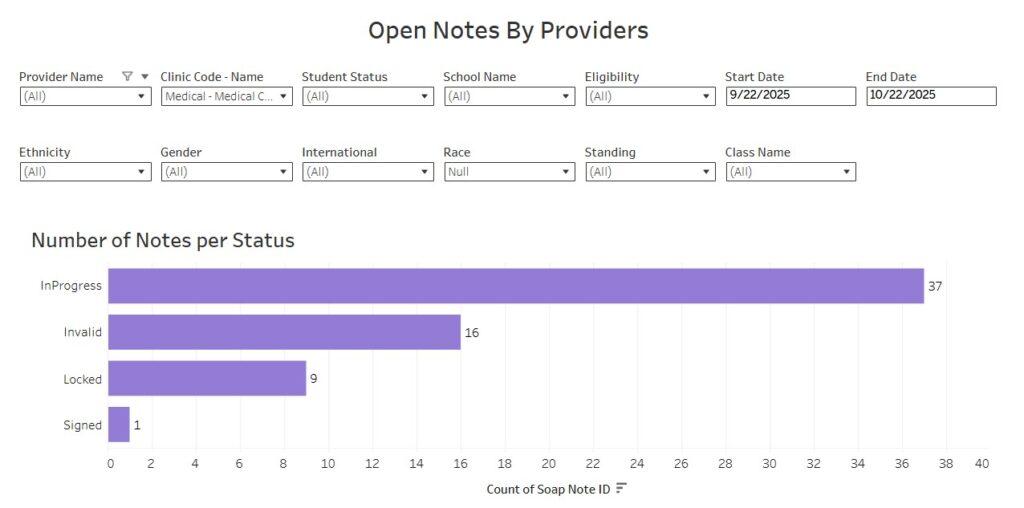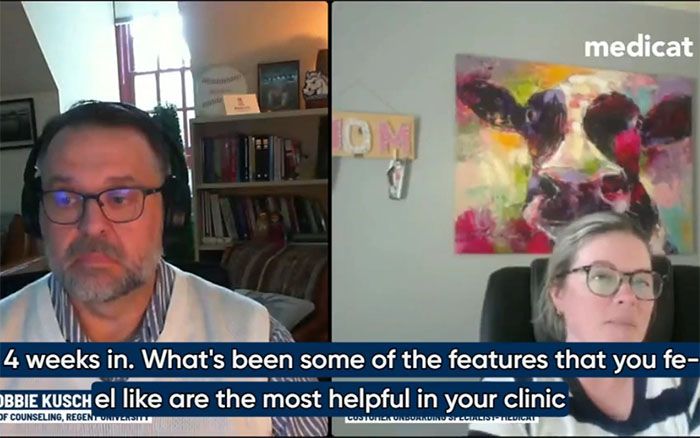Essential EHR Reports for Better Clinic Operations
Originally published on May 15, 2024. Updated October 22, 2025
Picture this: your VP of Student Affairs just asked for a report on student appointment reasons, and you’re bracing yourself for an all-nighter spent clicking through spreadsheets. But what if you could pull the exact report you need in minutes—without the caffeine IV drip? That’s the magic of a well-equipped EHR.
Data isn’t just numbers on a page. It’s one of the most powerful tools campus health and counseling leaders have to guide decisions. When harnessed effectively, reporting can reveal trends, spotlight areas for improvement, and even support more equitable access to care.
With MedicatOne’s reporting tools, staff and administrators get instant visibility into the metrics that matter most. For instance, MedicatOne reporting allows you to easily track diagnosis numbers, counseling session outcomes, or caseload counts.
In this blog, we’ll walk through some of the most valuable reports in MedicatOne, explore practical use cases for health and counseling services, and show why data-driven insights are game-changers for campus leaders.
To take a tour of our reporting tool, click “Get Started” below:
High Impact Reports in MedicatOne
Data overload? Not here. MedicatOne makes reporting feel less like digging through a filing cabinet and more like opening a well-organized toolbox. Reports are grouped into intuitive categories—Calendar, Charting, and Financials—so staff can find them quickly and easily.
This setup keeps teams efficient, shortens the learning curve for new users, and ensures the insights you uncover actually move the needle. Let’s look at some examples:
Appointment Statistics Report
The Appointment Statistics Report goes beyond tracking attendance. It gives a clear view of how appointments are being used across your clinics. It breaks down appointment volume by status (attended, canceled, rescheduled, not seen), reason codes, and total hours, helping you understand utilization at a glance.
- For counseling centers: Directors can identify trends. For example, rising cancellation rates during midterms, and use that insight to adjust scheduling or outreach efforts.
- For health clinics: Leaders can view appointment activity by clinic or provider. This helps monitor workload, optimize staffing, and support balanced care delivery.
By turning appointment data into actionable insight, the Appointment Statistics Report helps teams strengthen access, efficiency, and the overall student experience.

Open Notes by Provider Report
Nobody loves chasing down unfinished paperwork. With this report, you don’t have to! The Open Notes by Providers report tracks documentation status across your team, showing which notes are In Progress, Locked, or flagged as Invalid.
- For counseling leaders: It’s an easy way to keep tabs on backlogs before the end of the month sneaks up.
- For medical directors: Spot recurring issues in invalid notes and turn them into targeted training opportunities instead of recurring headaches.
Surfacing problems early, this report keeps your clinic organized and compliant.

Supervision and Training Report
Managing interns and staff training doesn’t have to mean juggling Excel sheets or paper clipboards. The Supervision & Training Dashboard gives counseling center leaders a clear snapshot of how time is spent. Get a clear understanding of how interns are doing individual counseling sessions, intakes, couples counseling, or even outreach. Plus, you can track rescheduled and cancelled appointments, too.
For supervisors, this means that it’s easy to confirm interns are hitting their training requirements without chasing down spreadsheets or sticky notes. The result? Training stays on track, service delivery stays student-focused, and accreditation standards get met without the scramble.
Here’s an example of what this report can look like when it is filtered to show the appointment activity of a particular trainee over a 90-day period:

Additional Reports in MedicatOne
The reports we’ve covered so far are just the beginning. MedicatOne offers a full suite of reporting options that give campuses even deeper insight into how services are used—and where they can grow. A few highlights:
- Staff Appointment Reports: This report allows you to track how many hours staff spend outside of clinical appointments. This report can also be helpful for counseling clinics tracking meetings between trainees and supervisors during the supervision process.
- Outreach Reports: Measure the real impact of campus engagement efforts, from wellness fairs to outreach campaigns, so you know what’s resonating with students.
- Referral Reports: Break down referral patterns by provider and referral type, helping clinics understand where students are being directed and whether referral processes are working as intended.
Together, these reports paint a clearer picture of how counseling and health services are utilized across campus. They’re especially powerful for end-of-year reviews, offering data-driven insights into mental health trends, service effectiveness, and opportunities for improvement.
Key Takeaways
MedicatOne’s built-in reporting features deliver actionable insights, giving campus leaders a clear, data-driven view of both operations and student care.
Leveraging a robust EHR with intuitive reporting features allows clinic directors to make more informed decisions that directly improve student wellness outcomes and strengthen the overall campus health ecosystem.





















